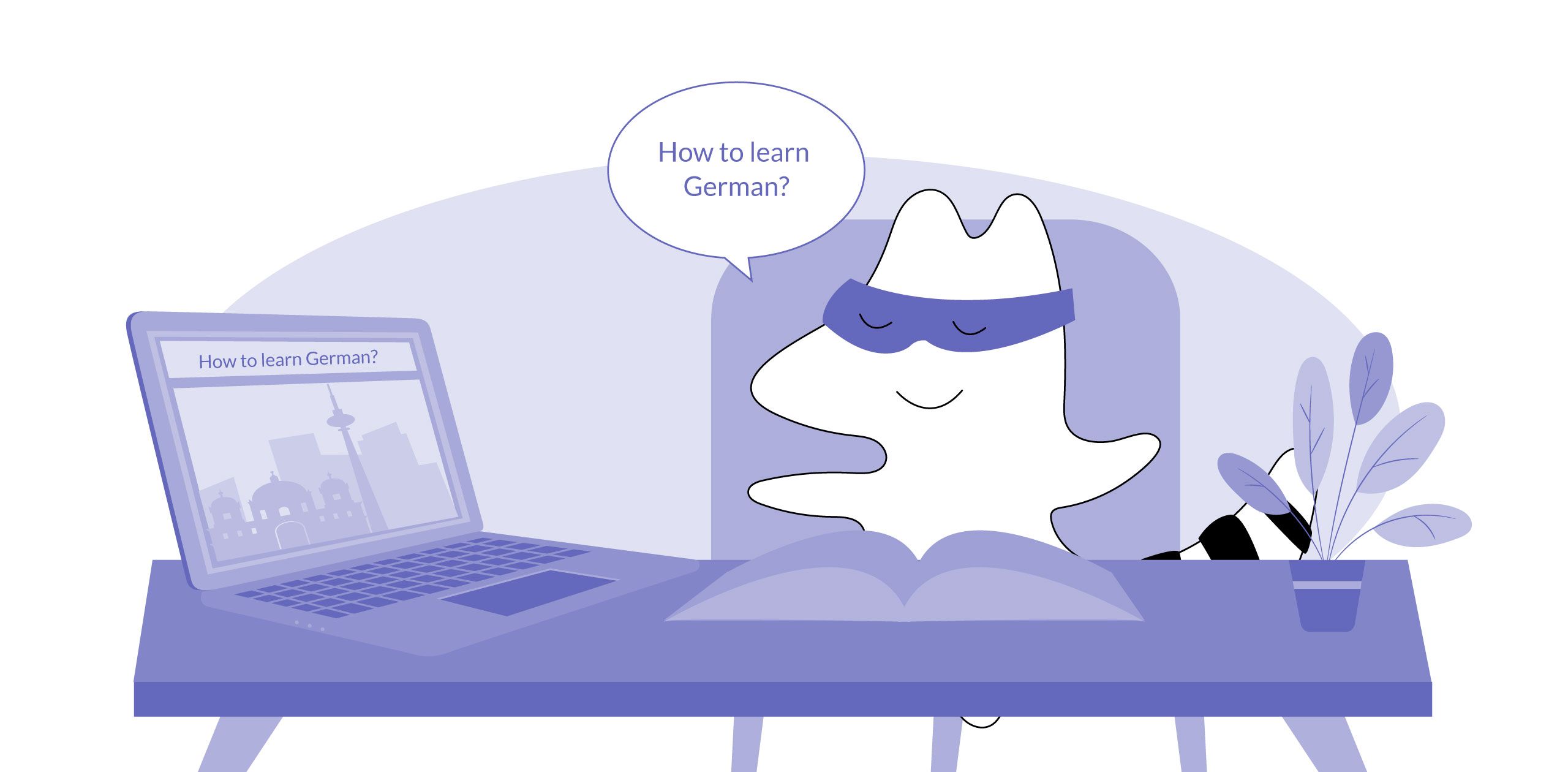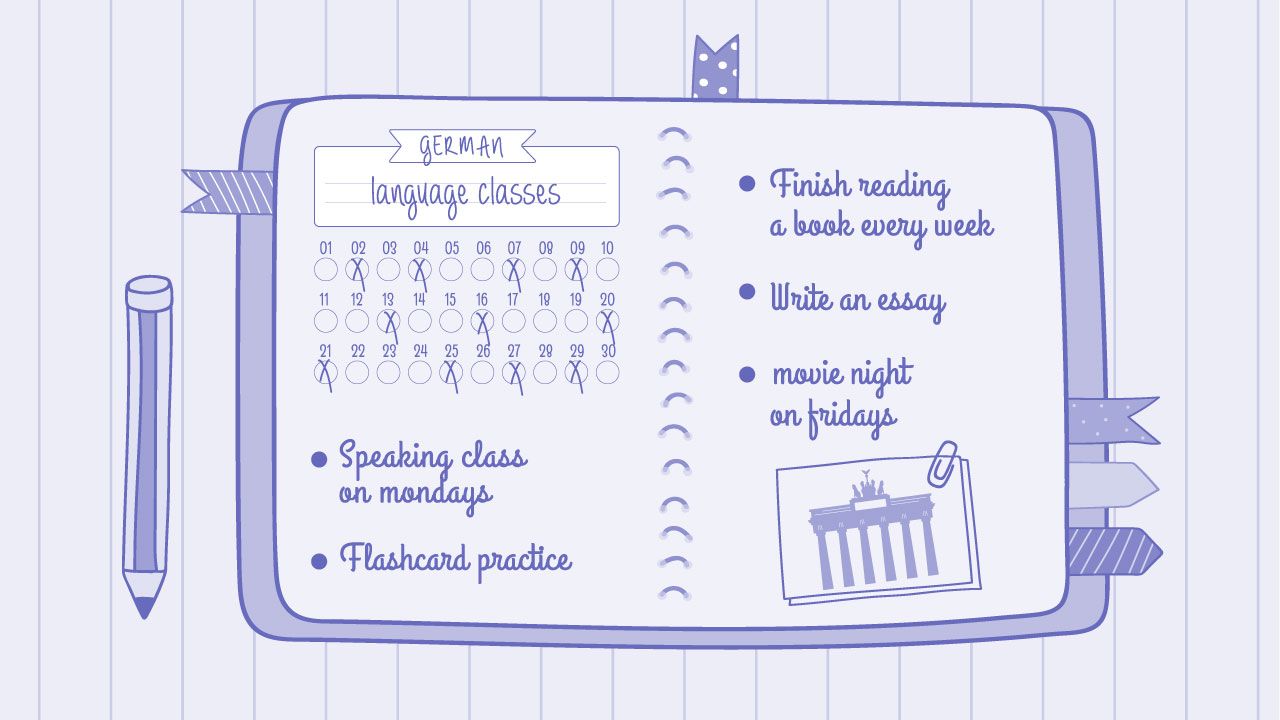
What is the best way to learn German? What do you need to do to speak German fluently in no time? Well, there is no definitive answer to this question, since different types of learners prefer different ways of learning, and there is no method that fits all.
But, regardless of how you prefer to study, there are many useful tips that can help you learn German more effectively and efficiently. By combining them together with your chosen method of learning – whether it’s language classes, online platforms, apps, or anything else – you can find your best way to get fluent.
So, below, let's explore some ideas on how you can boost the process of learning the German language – and make it both enjoyable and successful. Read on!
Learn German with Langster
Focus on Vocabulary
German words can be tricky, but they give you an insight into the language. After all, vocabulary is the essential foundation for speaking and comprehension. So, don't skip it, even if some other topics – like grammar or pronunciation – seem easier.
Instead, invest time and effort into learning, reviewing, and practicing German vocabulary.
How to Learn Vocabulary
Use various tools like flashcards, study apps or websites, language games, and mnemonics to help you memorize new words more effectively. Or, look for your own ways to learn new words.
For example, you can write down new words on sticky notes and stick them around your house or office as a daily reminder to use them in conversation. You can also make a list of words that are important to you, and focus on learning these first. It can also be helpful to learn words in clusters, grouping them by the topic you’re learning. For example: food, health, etc.
A great and enjoyable way to improve your vocabulary is to read German texts and newspapers, listen to German radio stations, and watch German TV programs. This will help expose you to a wide range of new words and phrases in different contexts – and it will be easier to remember them this way.

Find Your Way to Learn German Grammar
Grammar may seem scary at first if you don't already have a strong foundation in it from other languages that you know. But, don't let this stop you from moving forward with your German studies – after all, building a strong grammar base is critical for achieving proficiency in any language.
Remember to take it slow, though – don't overburden yourself with too much information at once. Instead, focus on one grammar topic at a time, and digest the rules thoroughly before moving on to new ones. It's important to find your perfect way to learn German grammar so that it doesn't get too challenging.
Some Ways to Learn Grammar
Learning German grammar can give you quite a headache, so here are some tips that you might find helpful for dealing with German grammar, whether it's basic or more complex topics:
- Invest in a good grammar textbook and utilize language exercises that are included to practice what you’ve learned.
- Create your own book for German conjugations, and write down the weak and strong verbs conjugated in different tenses there. By writing things down, you memorize them better!
- Find online articles that break down the rules that give you the most problems so that you can get a fresh look into them.
- Watch videos or listen to podcasts that cover grammar topics in a clear and understandable way.
- Create example sentences for every grammar rule you know – this will boost your memory and help you learn in context.
- Try teaching other German learners what you already know – this is called the protégé effect, and it’s a very useful tool for boosting your own knowledge.
Don’t Skip German Culture
Many people find that learning about the culture of a foreign country can help in the process of learning the language spoken there. Cultural knowledge provides a context for words and expressions, and it can give you insights into the way native speakers think and behave.
After all, language learning is not just about words or grammar – it's also about the history of the language, the place and the society where it evolved, and its speakers, among other things.
So, How to Explore German Culture?
A simple way to learn more about German culture is by checking books, articles, podcasts, and videos that cover various aspects of life in Germany. You can find whole websites and YouTube channels about the German way of doing things, whether it's running a business, communicating with neighbors, celebrating something, or creating meaningful relationships.
You can also find lots of cultural resources on social media platforms like YouTube or Instagram. By following popular accounts for people living in Germany, you can stay up-to-date on what's happening within the language community and experience a bit of the German lifestyle without leaving your own home.
Finally, there's always an option to immerse yourself directly into the country's culture by traveling to Germany or another German-speaking country. And, don't just visit its tourist attractions – explore different areas, practice speaking German by talking to locals, and participate in everyday life. Feel the country from the inside.

Look For A Way to Make Things Interesting
Learning a new language shouldn't be all hard and stuff – so, make it interesting. Look for your perfect fun way to learn German: watch movies with German subtitles, listen to German podcasts, or enjoy German social media. And, that’s just a start!
For example, if you're learning German verb conjugation and the past tense, try looking into memes that use those words in funny situations.
You could also find videos or songs on YouTube, read German fan fiction, watch German sitcoms, use funny apps in the language, create your own TikToks in German, and many more. There are numerous ways that you can make learning German a tad more fun. Try to find something that feels especially good for you.
Learn German in Practice
Practice is the key to success when learning a new language. Look for ways to regularly use what you know in practical settings, whether it's chatting with native speakers online, doing exercises, or reading German content.
The more you practice, the more your skills will grow.
Here Are Some Ways to Practice German:
- You can have learning sessions with other language learners – this will allow you to mix the individual learning approach with getting help from others.
- If you are attending a language class or learning with a tutor, try to have at least two lessons per week. A good German lesson should build up on your current knowledge by allowing you to practice what you know and learn new things at the same time.
- Consider language exchange. This is when you trade your time and skills, such as English teaching, for the opportunity to practice German with a native speaker. Not only will this help you learn new things and improve your fluency, but it can also be a lot of fun.
- Use a language learning app to learn on the go or when you don’t have much time. There are many apps out there focusing on learning new vocabulary, practicing speaking, or mastering grammar – choose something that fits your needs.
- Find ways to use German regularly in real-life situations. For example, if you are learning the language because of work or travel plans, try using it with co-workers, colleagues, family members, friends, and other people who know how to speak the language. This will not only help you hone your skills but also give you more confidence in using the language on a day-to-day basis.

Remember to Stay Motivated
When learning any foreign language, it’s important to keep your interest high and avoid getting bored or discouraged by the learning process. To stay motivated, it's critical to find inspiration or goals that will keep you going.
It's necessary to set both short-term and long-term goals. A long-term goal should be the reason you are learning German in the first place. When you know it, divide it into smaller chunks, and create short-term goals that will correspond to it but will look more like steps on the road to achieving your dream.
For example, in the long term, you might dream about going on a trip to Germany where you can put everything into practice, meet German speakers in person, and enjoy yourself naturally in the language.
To do so, you can set such short-term goals as learning the basic traveling vocabulary in a month, mastering three simple grammar constructions, and watching a video about life in Germany.
Achieving smaller goals will also give you satisfaction, as you will be able to track your progress and see what you've already learned. Also, double up on your effort by setting yourself a deadline, as it will help you stay focused and driven to reach your goals.
This, of course, is just the start – look for more ways to motivate yourself when learning here.

Bottom Line
Learning German can be tricky and challenging, but also a lot of fun. With the right methods and tools, you can find the best ways to take that on and achieve the best results.
Whatever method you choose to study German, remember that there's no one-size-fits-all approach – it all depends on your preferences and learning style. So, don't be afraid to experiment until you find what works best for you!









